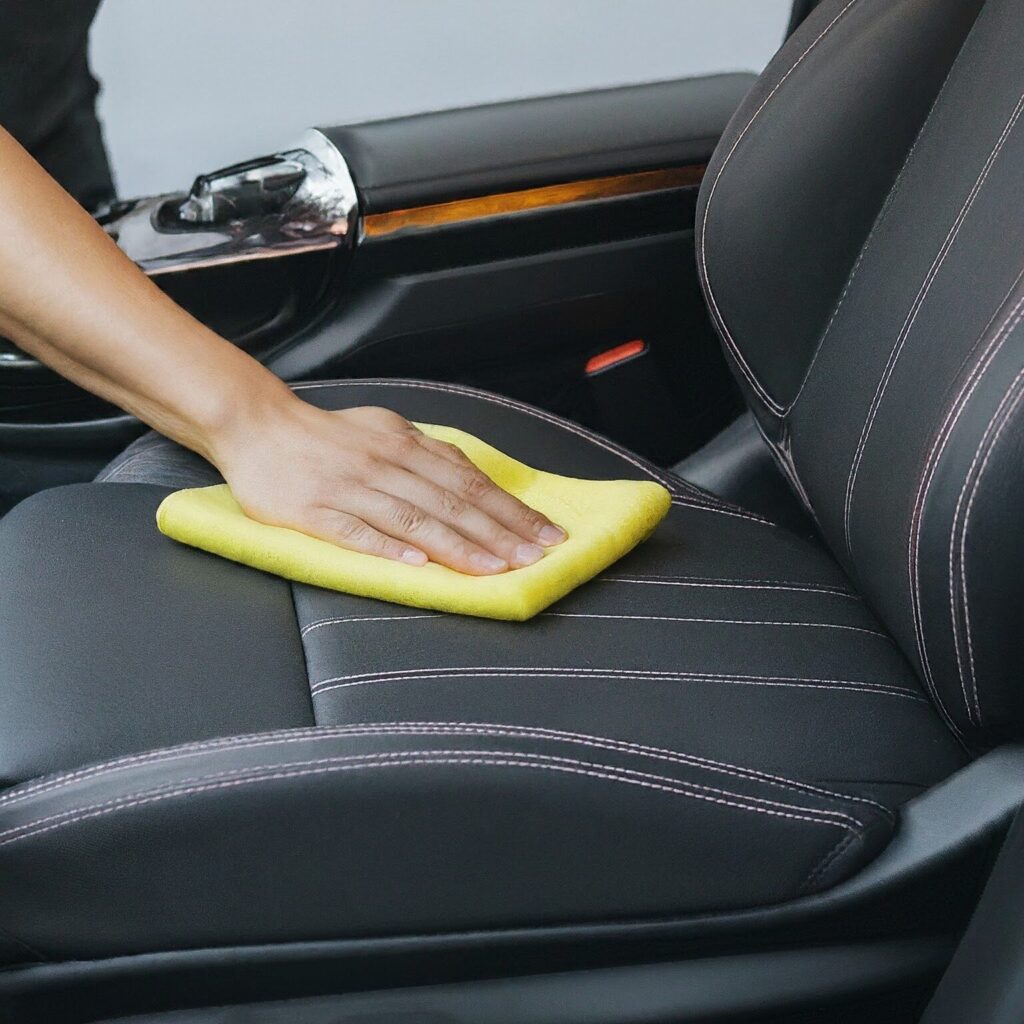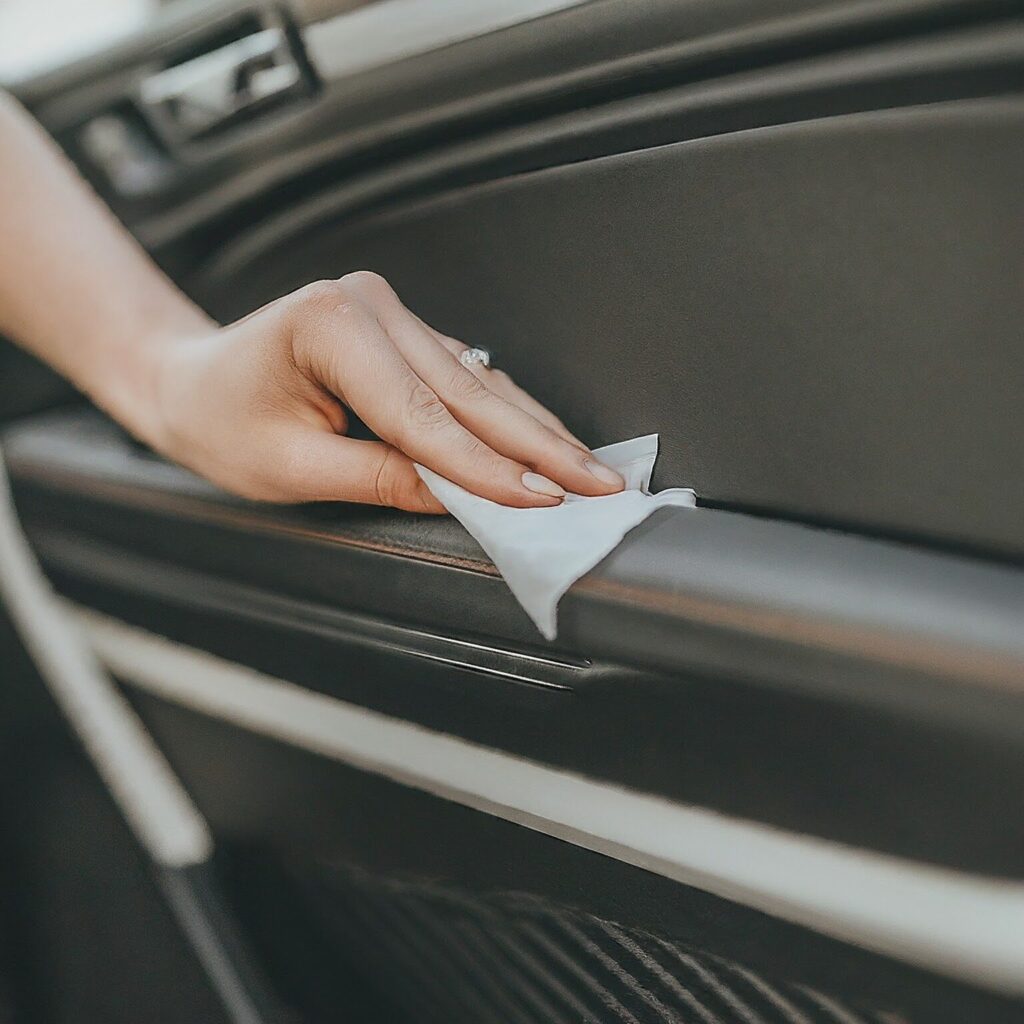Can I Use Disinfectant Wipes on the Car Seat?

Ensuring the cleanliness and safety of your child’s car seat is most important for their well-being. With numerous germs and potential contaminants hiding in the environment, parents often turn to disinfectant wipes as a quick and convenient cleaning solution. But is it safe to use disinfectant wipes on a car seat? Let’s delve into the details.
While disinfectant wipes can be effective in killing germs, it’s essential to use them correctly to protect both your child and the car seat. This guide will provide you with comprehensive information on using disinfectant wipes on your car seat, along with alternative cleaning methods and safety tips.
Understanding Disinfectant Wipes
Disinfectant wipes are pre-moistened cloths infused with chemicals designed to kill germs. They are widely used to clean various surfaces, including kitchen countertops, doorknobs, and bathroom fixtures. However, their effectiveness and safety on car seats require careful consideration.
Can I use disinfectant wipes on my car seat?
Yes, you can use disinfectant wipes on your car seat. However, there are a few things you need to keep in mind:
- Only use wipes that are specifically designed for use on car seats. Some disinfectant wipes can damage the fabric or plastic of your car seat.
- Do not use bleach or other harsh chemicals on your car seat. These chemicals can damage the fabric or plastic of your car seat.
- Always test the wipe on a small, inconspicuous area of the car seat before using it on the entire seat. This will help you to ensure that the wipe does not damage the fabric or plastic.
- Make sure to rinse the car seat thoroughly with water after using a disinfectant wipe. This will help to remove any residue from the wipe.
How to Use Disinfectant Wipes on a Car Seat

Step-by-step guide:
- Prepare the car seat: Remove any loose items or debris.
- Choose the right wipe: Opt for a disinfectant wipe specifically designed for baby products or car seats.
- Test the wipe: Apply the wipe to a small, inconspicuous area of the car seat to check for colorfastness and material compatibility.
- Wipe down the car seat: Gently wipe the entire car seat, paying attention to areas prone to germs like buckles, straps, and headrests.
- Rinse thoroughly: Use a clean, damp cloth to remove any residue left by the disinfectant wipe.
Safety Precautions
- Avoid harsh chemicals: Stay away from wipes containing bleach, ammonia, or other strong chemicals that can damage the car seat.
- Protect the car seat material: Follow the car seat manufacturer’s cleaning instructions.
- Proper ventilation: Ensure adequate ventilation when using disinfectant wipes indoors.
What are the benefits of using disinfectant wipes on my car seat?
Disinfectant wipes can help to kill germs that can cause illness, such as the flu, cold, and norovirus. They can also help to remove dirt, dust, and other allergens from your car seat.
What are the risks of using disinfectant wipes on my car seat?
Disinfectant wipes can damage the fabric or plastic of your car seat. They can also be harsh on the skin, so it is important to rinse the car seat thoroughly with water after using a disinfectant wipe.
How often should I use disinfectant wipes on my car seat?
You should use disinfectant wipes on your car seat whenever it comes into contact with bodily fluids, such as vomit, diarrhea, or blood. You should also use disinfectant wipes on your car seat after someone who is sick has been in the car.
How else can I clean my car seat?
In addition to using disinfectant wipes, you can also clean your car seat with a vacuum cleaner and a damp cloth. You should vacuum your car seat regularly to remove dirt, dust, and other allergens. You should also wipe down your car seat with a damp cloth after each use.
What are some other tips for keeping my car seat clean?
- Cover your car seat with a car seat cover. This will help to protect your car seat from spills and stains.
- Wash your car seat cover regularly.
- Do not allow food or drinks in your car.
- If you have a pet, do not allow them to ride in the car seat.
Specific Cleaning Scenarios
Handling Spills and Stains:
- Food and drink spills: Blot up excess liquid, use a mild detergent solution, and rinse thoroughly.
- Vomit and other bodily fluids: Clean immediately with a disinfectant wipe or a mixture of water and vinegar, then rinse thoroughly.
- Urine: Use a mixture of water and vinegar, followed by a thorough rinse.
- Blood: Use hydrogen peroxide, followed by a thorough rinse.
Cleaning Different Car Seat Materials:
- Fabric car seats: Use disinfectant wipes according to the above steps.
- Leather car seats: Avoid disinfectant wipes. Use a leather cleaner and conditioner.
- Plastic car seats: Disinfectant wipes are generally safe, but test on a small area first.
Alternative Cleaning Methods
- Vacuuming: Regularly vacuum the car seat to remove crumbs and dirt.
- Steam cleaning: Consider professional steam cleaning for deep cleaning.
- Car seat covers: Use washable covers for added protection.
General Disinfectant Wipes Suitable for Car Seats
Here are some popular brands known for their gentle yet effective formulas:
- Babyganics Foaming Hand Sanitizer Wipe: These wipes are alcohol-free and hypoallergenic, making them suitable for sensitive surfaces like car seats.
- Seventh Generation Free & Clear Baby Wipes: Designed for babies, these wipes are free from harsh chemicals and can be used on car seats.
- The Honest Company Baby Wipes: Another gentle option, these wipes are made with natural ingredients and are safe for car seat cleaning.
Remember: Always check the product label for specific instructions and to ensure it’s safe for use on car seats.
Conclusion
Maintaining a clean and germ-free car seat is essential for your child’s health and safety. By following the guidelines in this article, you can effectively clean and sanitize your car seat. Remember, prevention is key. Regular cleaning, avoiding food and drinks in the car, and using car seat covers can significantly reduce the need for deep cleaning.
